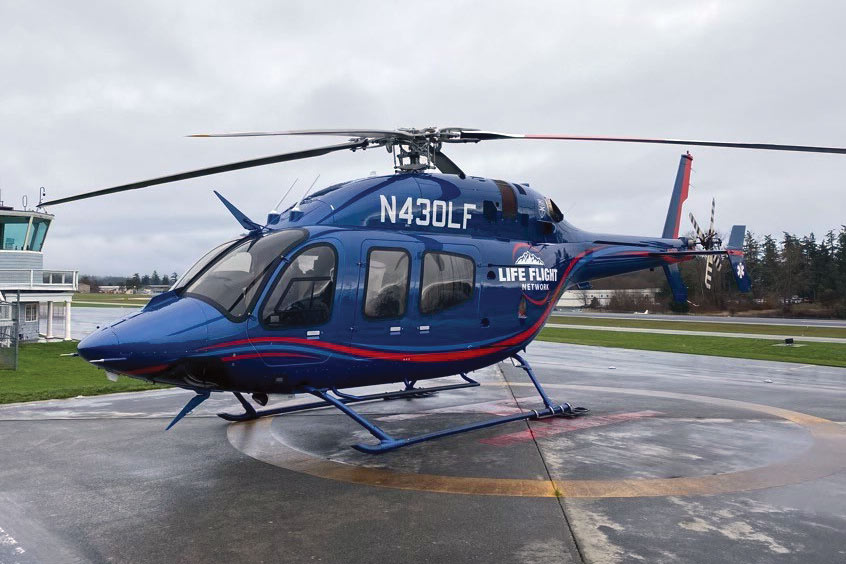
Life Flight Network has announced a series of new investments and innovations across its air and ground fleets. The organisation has added four new Bell 429 helicopters to its fleet, bringing capabilities to communities in the Pacific Northwest and Intermountain West regions.
The Bell 429 can fly in the challenging weather conditions common to the area. It also features the largest cabin of any civilian EMS helicopter in the region with more room for patient care; and high visibility exterior lighting for safer patient boarding at night. In addition to the Bell 429s, Life Flight Network's new investments include a world‐class flight training simulator, six state‐of‐the‐art ground ambulances and the addition of onboard plasma transfusion capability.
“We are thrilled to announce these new lifesaving capabilities,” says Michael Griffiths, CEO of Life Flight Network. “As a not‐for‐profit air and ground ambulance provider, we reinvest in safety and access to care for the communities we serve, rather than returning profits to shareholders. For more than 43 years throughout the Pacific Northwest and Intermountain West, we've placed lifesaving air ambulance resources in rural communities where they're needed most.”
Life Flight Network's $34 million investment in four new Bell 429s reflects its longstanding commitment to safety and quality care. The Bell 429 is among the fastest and most technologically advanced EMS helicopters on the market. As an IFR certified helicopter, the B429 allows safe operation in a wide range of challenging weather conditions, including heavy rain, high wind, and low visibility. IFR flight is utilised extensively by commercial airlines and allows pilots to safely navigate poor weather conditions by relying solely on their cockpit instrumentation. Life Flight Network's new Bell 429s come equipped with various safety enhancements, including a four‐axis autopilot, which increases its IFR capabilities. They feature a spacious cabin large enough to provide unencumbered, full‐body access to the patient. Life Flight Network worked closely with the manufacturer on the design of the medical interior.
These added capabilities, particularly in the Pacific Northwest, allow Life Flight Network to safely and quickly get patients the lifesaving care they need.
“Our crews are dispatched in any number of challenging conditions,” says Dominic Pomponio, Life Flight Network regional vice president. “Our investment in the Bell 429s gives Life Flight Network the best‐in‐market capabilities to safely and quickly respond to emergencies, even with the challenging weather conditions in the Pacific Northwest.”
Every Life Flight Network aircraft is equipped to operate as a mobile intensive care unit (ICU) with leading‐edge medical equipment such as video laryngoscopes, ICU ventilators and blood products, allowing specialised critical care treatment during transport. Life Flight Network aircraft are staffed with a flight registered nurse, flight paramedic, and highly skilled EMS pilot. Its bases operate 24 hours a day, seven days a week.
Under development for more than a year, Life Flight Network has also brought online a Frasca flight simulator to augment its rigorous pilot training programme. Life Flight Network's simulator lab contains a state‐of‐the‐art simulator and enough space for pilots to prepare for and analyse their flights. Built specifically for Life Flight Network, the new simulator allows pilots to practice manoeuvres and scenarios that cannot be practised in live aircraft training. Additionally, Life Flight Network is leading the industry by providing medical crews with the ability to “ride‐along” in the simulator and experience real‐world examples of in‐flight hazards and weather.
“We are committed to ensuring the safety of our patients and crews,” continues Griffiths. “The new simulator expands our training programme and gives our pilots invaluable practice at safely handling even the most challenging situations and weather conditions.”
The simulator is customised for Life Flight Network's specific needs and allows for realistic, immersive and scenario‐based training. This world‐class resource represents a significant investment and will allow pilots to practice a host of scenarios that are difficult to simulate in an actual aircraft.
Life Flight Network was the first ambulance company in the Pacific Northwest to carry blood products onboard its aircraft, enabling red blood cell transfusions during transport. Life Flight Network's partnership with Providence Regional Medical Center Everett now allows flight clinicians to provide both plasma and red blood cell transfusions – a significant advancement in the ability to slow and replace blood loss for trauma patients. Plasma is the liquid portion of blood that contains water, proteins, and clotting factors. Plasma transfusion can help with clotting, levelling off blood pressure, and restoring electrolytes during trauma and extreme blood loss.
“We're proud to partner with Providence Everett to give paramedics and nurses one more tool during transport that can save lives,” comments Dr. Jim Bryan, medical director. “While we have been administering red blood cell transfusions for decades, advancements in technology now allow us to store and administer plasma in an out‐of‐hospital setting.”